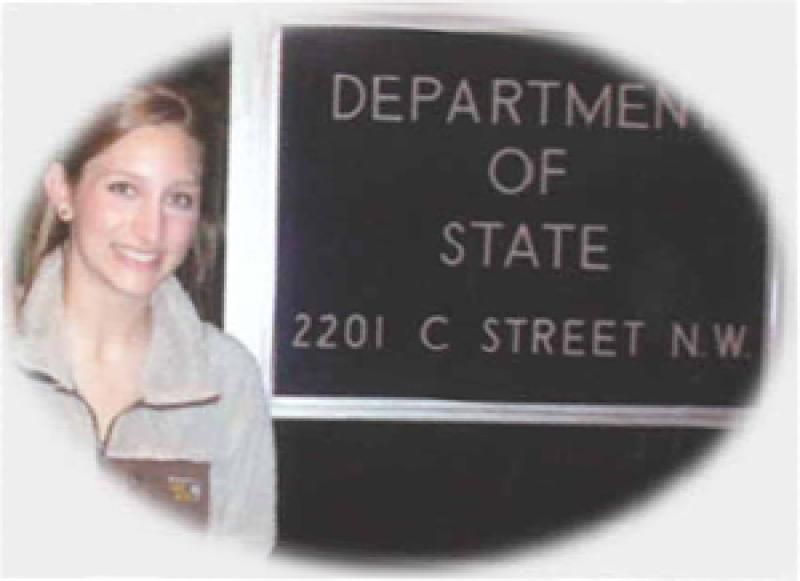Bureau of International Organization Affairs: Working to Create Human Rights Policies of the United States
Kathryn Bashour

"My internship at the U.S. Department of State had very humble beginnings— it all began with a visit to the International Studies office in Townshend Hall. One day, after feeling pressured by my peers who were nailing internships all over the country, I went to my advisor to ask about courses for Winter Quarter and to ask if I should apply for any internships. My advisor promptly handed me a 45 page information packet and application instructions manual for an internship at the State Department. It took four hours on a Sunday morning to complete the first step of the application process and another month to acquire all of the required information and documentation before I formally submitted my application to the Department. The next step was an eight month waiting period during which I received two preliminary offers in two separate offices in the Bureau of International Organization Affairs. I finally received full clearance to begin work in the State Department one week before I was set to move into my apartment in Washington, D.C.
My first day at work was filled with briefings on appropriate work behavior, how to report suspicious activity within the Department, and how to transport classified information. Interested by the presenters, I investigated the duties of the Department further. The mission of the U.S. Department of State is founded on creating democratic, secure, and prosperous relationships between foreign governments and the United States. Applying these pillars to the 21st century, the Department focuses on three elementary beliefs, "… our freedom is best protected by ensuring that others are free; our prosperity depends on the prosperity of others; and our security relies on a global effort to secure the rights of all." Through my experience, I found the Department truly upholds these pillars.
My day-to-day work involved compiling documents and briefings for my supervisors and the Assistant Secretary as well as one of her Deputy Assistant Secretaries. My work never involved watching from the background; instead, I was asked to sit at the table at meetings involving foreign dignitaries or representatives from other governmental agencies to participate in discussions involving international issues. After working in the Office of Human Rights for a few weeks, I was assigned the task that would become my project for the rest of my internship. I was in charge of processing data for the Human Rights Council 2011 Review.
The Human Rights Council is a body of the United Nations that is devoted to monitoring human rights around the world. Many of the 47 member states of the Council submitted suggestions for improvement to the Council, and it was my job to determine which of these suggestions aligned with the U.S.'s proposals and goals for the Review and which of these suggestions either had no impact on the U.S.'s desired outcomes or did not line up with U.S. ambitions. I was in charge of making the preliminary review of the suggestions to determine which capitals the United States was going to need to lobby to help get U.S. propositions heard and implemented. The Chief of Human Rights and the Director of the Office of Human Rights then assessed my work before it was sent to the U.S. Ambassador to the Human Rights Council for use in negotiations before the Council.
The most difficult aspect of this internship was the demanding nature of the work. My work day was longer than most interns because deadlines had to be met with respect to different time zones. Since the Human Rights Council meets in Geneva, Switzerland, my work had to be submitted at the absolute latest no later than 3:00AM in Washington, D.C. to be available at the opening of business in Geneva. Even though the work was difficult and exhausting, I have never had a more rewarding experience. To know my work was helping to end human rights violations made the late nights worthwhile.
My experience at the Department of State was incredibly educational and enlightening, and I highly recommend the program to other students."
